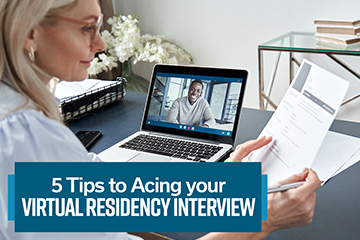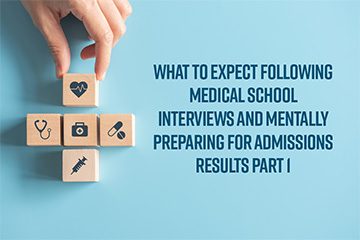
5 Tips to Acing your Virtual Residency Interview
With the decision to continue with virtual interviews into the 2022 Resident (R-1) Match, and the possibility of this format persisting, knowing how best to approach your virtual residency interview is crucial.
Much of the pre-interview preparation is identical to preparing for an in-person interview; however, there are a few important differences and points to consider, unique to virtual interviews, which I discuss below. With that being said, here are my top tips for acing your virtual interview!
- Know the Software
Each university uses a specific software, for example Cisco Webex and Zoom, through which they conduct their virtual interviews. So, it is important to read the information and instructions in your interview offer email carefully to ensure you have downloaded the appropriate software, if required, well in advanced to your interview date. As well, ensure your computer has a camera, is up to date, and compatible with the software.
- Ensure a Strong Internet Connection
A strong internet connection is imperative. Many universities will request a phone number, to reach you at in the case of technological difficulties, but it is always better to take every step to ensure a secure and strong internet connection, such as using an Ethernet cable. This will also have the added benefit of projecting a clearer video image to your interviewer(s) and better sound quality.
- Create a Professional Background
Conducting your interview from a quiet location where you will not be disturbed is presumed. Your background and lighting however, although a little more difficult to perfect, can give you an edge by helping you to appear more professional and serious about the program to which you are applying. A blank wall is always safe, although often difficult to find in your home, but any clean background, such as a well-organised book shelf, will suit. I would also recommend not conducting an interview with your bed visible in the background. In terms of lighting, face a large window as natural lighting is often the most flattering. Finally, make sure your camera is positioned level with your eyeline (this may require you to prop your computer onto a stack of books) and that your video frame showcases some of your torso and not only your head.
- Maintain “Virtual Eye Contact”
Maintaining eye contact during an interview is difficult, but even more so in a virtual format. It is a natural instinct to want to stare at your computer screen and at your interviewer(s). However, if you spend your entire interview looking at your screen, from your interviewer’s perspective it will appear as if you are looking down rather than directly at them. To avoid this issue, I recommend placing a sticky note on either side of your computer’s camera, to guide your eyes more easily to the location you want to be looking at, and of course practicing. At first, staring at your camera for a long period of time will feel uncomfortable, but repetition is key to making this both look and feel natural.
- Employ Body Language
Unfortunately, with virtual interviews you need to work a little harder than you normally would in an in-person setting to showcase to your interviewer(s) your interest and enthusiasm in their program. One way to effectively communicate this is through your body language. Smiling, nodding, leaning forward in your chair, and hand gestures will all help you appear more animated and natural. Although good posture is important, make a conscious effort to avoid looking too stiff, as this is often reflexively done when in front of a camera.
Hopefully you found these tips helpful. Though simple, they can sometimes make or break your interview.
Best of luck with your CaRMS interviews!






